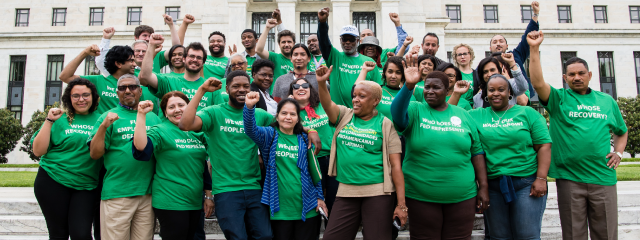Blog
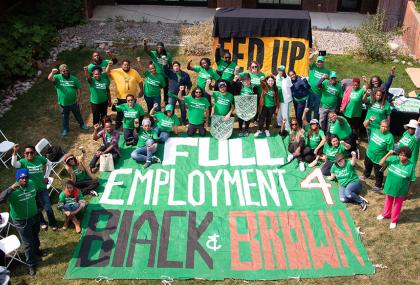
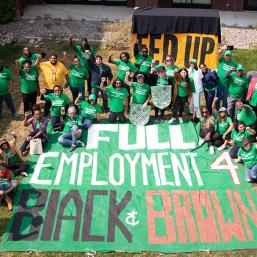
For the fifth consecutive summer, CPD and Fed Up activists travelled to Jackson Hole, Wyoming -- where the world’s most powerful economic policymakers gather to discuss the direction of the global economy. The topic of this year’s symposium was corporate concentration and its effect on wages. The Fed has said flat wages are a “puzzle,” and Fed Up arrived in full force with over 50 workers of color from across the country, activists and academics to give them the answer to that puzzle: corporations have too much power, workers don’t have enough power and that imbalance is keeping wages low. CPD affiliates including SPACES DC, Action NC, New Georgia Project, New York Communities for Change (NYCC), Make the Road New York, Missourians Organizing for Reform and Empowerment (MORE), and Organization United for Respect (OUR), made sure the Fed could not ignore this obvious truth as they chart the future direction of the economy.
On August 23, CPD’s Fed Up team kicked off the event with in-depth popular education including a Full Employment Defense workshop focused on corporate concentration: big corporate monopolies, like Amazon, growing more powerful and keeping workers' wages low. Following the training, Fed Up hosted a panel in the designated “First Amendment Zone” outside of the Jackson Lake Lodge where academics and workers discussed how market concentration keeps wages down and, importantly, how that means the Fed should let unemployment get significantly lower before raising interest rates. On Friday, Fed Up members led tours and activities across the Jackson Hole Lodge to occupy the same space as the most powerful people in the economy and fill it with their stories about how they still haven’t recovered from the last financial crash.
When Fed Up first came to Jackson Hole, we were called protestors who were disrupting the Fed’s meeting, then activists trying to push our agenda. This year, for the first time, our coalition of workers of color were considered “experts” whose views shaped the most important economic conversation in the country in this moment. The coalition was featured in Reuters, CNBC, The New York Times, The Washington Post, and The Wall Street Journal, among others. Visit CPD Action’s Facebook page to hear directly from the workers who joined Fed Up in Jackson Hole and follow the hashtag #10YearsAfter.
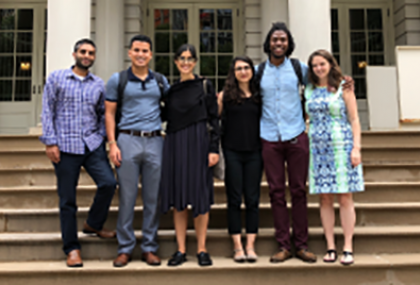
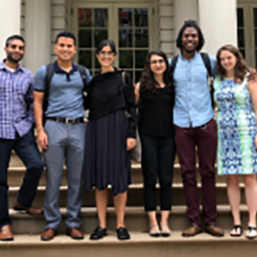
This summer, we were thrilled to be joined by a group of law and policy interns from across the nation. Our intern class became an integral part of the CPD team, providing legal and policy research and analysis for the organization and our network. Our interns worked to develop popular education, viable policy options, and deeper visioning materials for our racial justice, education, voting rights and democracy, economic justice, and worker rights campaigns.
The interns’ work covered a range of issues, including progressive policing practices, alternatives to 911, compliance of school discipline policies under the Civil Rights Act, local voting rights, prot-tenant policy options, crafting legal and policy primers related to the Federal Reserve Bank, and right to counsel initiatives for immigrants in detention.
The class helped support events in New York and Washington, DC, including direct actions calling for an end to family separation, blocking anti-worker Federal Reserve appointees, stopping a Trump Supreme Court confirmation, demanding an end to the school-to-prison pipeline, and to cease ICE raids in communities.
Thank you to the 2018 CPD Law and Policy Innovation Intern Class for your contributions. Please visit our website for a listing of current openings at CPD, including our Law Graduate Public Interest Fellowship program.
2018 Summer Interns: Hira Ahmed (New York University School of Law '19) Eric Cardenas (Sandra Day O'Connor College of Law, Arizona State University '19) Hajar Hasani (Northeastern University School of Law '20) Demarquin Johnson (Harvard Law School / Kennedy School of Government '20) Yazmine Nichols (Fordham University School of Law '20)


In August, the CPD Strategic Research team will be joined by Eli Vitulli, a two-year fellow from the Mellon/American Council of Learned Societies (ACLS) Public Fellows program. The Mellon/ACLS Public Fellows program places PhDs in the humanities or social sciences with nonprofit organizations and government agencies working in the fields of policy, civil rights, arts and culture, and the media. CPD is one of 24 organizations nationwide selected as a partnering host organization for the 2018 Public Fellows cohort. The program is funded by a grant from The Andrew W. Mellon Foundation.
Eli comes to CPD with a Ph.D. in American Studies, and a minor in Feminist and Critical Sexuality Studies, from the University of Minnesota. His academic research examines social justice movements and the impact of state institutions and violence--especially the US criminal legal system--on marginalized communities, with an emphasis on queer and trans people, disabled people, and people of color. He is also currently working on a book about the history of US prison and jail practices regarding the management of gender nonconforming and trans people from the early twentieth century to the present. Eli has taught in Gender, Women, and Sexuality Studies and American Studies departments at Grinnell College, Mount Holyoke College, University of Massachusetts at Amherst, DePaul University, and University of Minnesota.
In addition to his academic work, Eli has been involved in grassroots organizing and nonprofit work for the past 15 years. His work with the Transformative Justice Law Project of Illinois (TJLP), the CeCe McDonald support committee, the Sylvia Rivera Law Project, the National LGBTQ Task Force, and Not In Our Name included conducting research, developing communication materials for the community and media, organizing community and fundraising events, helping develop organizational infrastructure, and providing support for community-based campaigns.
At CPD, Eli will join the rest of the research team in meeting the strategic research needs of all our campaigns and affiliates. Welcome Eli!
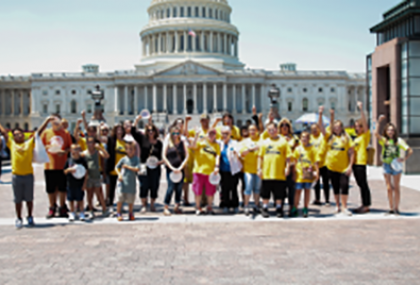
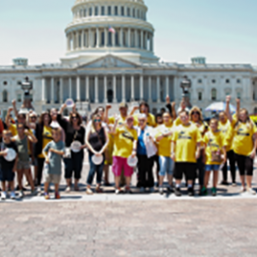
Earlier in May, we joined our sister organization CPD Action (CPDA) to launch our Summer of Heroes in DC campaign, focused on organizing weekly actions led by our affiliates including mobilizations, lobby visits, and other federal fighback advocacy efforts. As Congress was returning from its July 4 recess, CPD/CPDA brought hundreds of grassroots leaders to Washington, DC to raise our voices and take action on issues of critical importance to our communities.
On July 10, CPD/CPDA affiliates and allies came to the DC to demand that the Farm Bill protect Supplemental Nutrition Assistance Program (SNAP) benefits for low-income families. The version of the Farm Bill passed by the House would reduce or eliminate SNAP benefits (food stamps and other nutrition assistance) for up to two million households. CPD/CPDA affiliates Our Children Our Future and SPACEs, together with allies like the Center for Community Change and the Philadelphia Unemployment Project, brought over a hundred people to DC – many of them families who would be directly impacted by these cuts. Stormy Matlick, for example, is a single working mother of three who boarded a bus in West Virginia at 2am to tell her Congressional representatives that they have no right to decide whose children will or won’t have food to eat. We met with ten Congressional offices and held three accountability actions at the offices of House Speaker Paul Ryan, Representatives Mike Conaway (one of the primary architects of the House bill) and Alex Mooney (who represents many of the West Virginians who had traveled to DC that day.)
On July 12, over a hundred youth came to DC to speak out against the the school-to-prison-and-deportation pipeline. Youth from CPD/CPDA affiliates Make the Roads New York and Connecticut were joined by allies from the Urban Youth Collaborative, the Advancement Project, and Communities for Just Schools Fund. Since the Federal School Safety Commission formed by the Trump administration in the wake of the Parkland school shooting has shown little interest in actually listening to youth of color, the young people brought their concerns directly to the Department of Education (DOE) in a “People’s Listening Session” outside DOE headquarters. With calls for “counselors not cops,” the youth denounced the presence of police in schools as a misguided approach to school safety, and defended Obama-era guidelines addressing racial bias in school discipline. The young people also held 16 meetings with members of Congress encouraging them to divest from policing and deporting young people, to invest in students and teachers, and to preserve the civil rights of young people. The action was covered by Politico. We urge you to support CPD’s Summer of Heroes program by making a donation today.

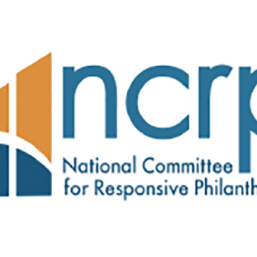
The National Committee for Responsive Philanthropy (NCRP) promotes philanthropy that serves the public good, is responsive to people and communities with the least wealth and opportunity, and is held accountable to the highest standards of integrity and openness.
As part of an ongoing blog series featuring NCRP’s nonprofit members, CPD’s Network President and Co-Executive Director, Jennifer Epps-Addison, spoke to them about the importance of general operating support. NCRP explains that “Grantmaking in this new era calls for funders who trust their grantees with general operating support, and who acknowledge and support leaders of color. CPD’s successes and structure present a testament to these two needs.”
Since the 2016 election, CPD Network affiliates have helped organize more than 860 resistance events that were attended by more than half a million people. Our network also hosted over 15 major civil disobedience actions on issues ranging from immigration to taxation to health care. Without flexible funding, this work would be nearly impossible. As new problems arise faster than ever before, CPD and our affiliates, like many organizations operating in our time, need the flexibility to change course at any given moment. Read NCRP’s full blog post here.
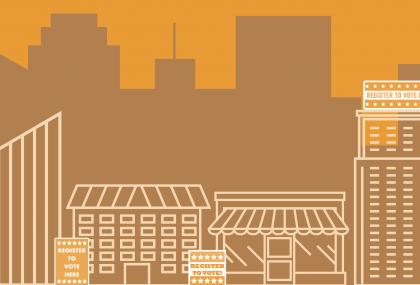
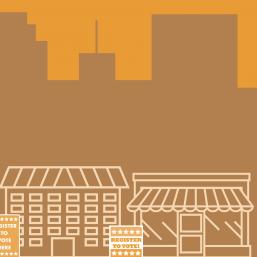
In July, the Center for Popular Democracy (CPD) released a new policy toolkit, “Expanding Voter Registration in Cities and Counties: A Toolkit for Local Policymakers.” The toolkit accompanies CPD’s previously-released report, “Deepening Democracy: How Localities Can Expand Voting Rights” and offers resources and materials to assist city and county policymakers in developing and advancing policy reforms that will expand voter registration in their jurisdictions. The report and toolkit highlight opportunities for local jurisdictions to fight back against more than a decade of attacks on voting rights and democratic participation, which have undermined core principles of representative democracy and eroded the political participation of ordinary citizens and the Rising American Electorate.
In this political moment, protecting our democracy and strengthening the political power of communities of color, immigrants, and residents with low incomes must be a local imperative. The newly-released toolkit lifts up policies that expand voter registration at city or county agencies as a way to counter the attacks on voting rights and expand access to voters, particularly in states that have been hostile to broadening voter participation. With this policy reform, designated local agencies offer eligible voters the opportunity to register to vote when applying for other services—for example, through agencies that provide human and social services, affordable housing, and health programs, among others. Local agencies are strategic places to expand voter registration because they administer services, utilities, benefits, and programs that serve local residents, and disproportionately reach low-income communities and communities of color—who are under-registered to vote compared to their wealthy and white counterparts.
The policy toolkit consists of two parts:
-
A model local agency voter registration ordinance, which provides local jurisdictions with model policy language and highlights key areas where local elected officials can tailor the policy to fit the unique context of their jurisdiction.
-
Communications materials, to help local elected officials and advocates communicate effectively about the importance of agency-based voter registration.
Community members, advocates, and ordinary citizens can urge local elected officials to use this toolkit and implement local voter registration policies. By passing these policies, we can pave the way for meaningful policy change in 2018 and beyond. For more information, read “Deepening Democracy: How Localities Can Expand Voting Rights,” and access the toolkit here.
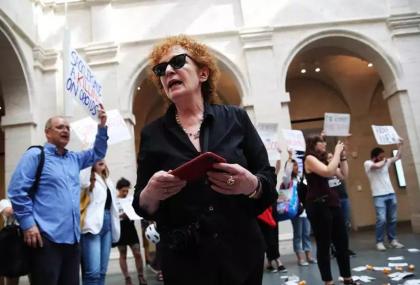
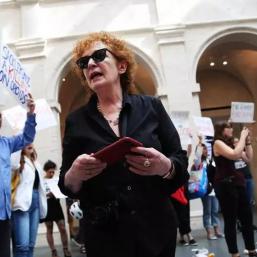
In recent years, billionaire pharmaceutical executives and hedge fund managers have made billions in profit by creating, feeding, and treating a crisis of opioid addiction in the United States. As the opioid crisis has turned into a full-blown national public health epidemic, CPD’s Opioid Network, in partnership with Hedge Clippers and P.A.I.N., continue to take action and address the current overdose crisis. On July 20, as part of an ongoing series of protests to target notorious profiteers for their role in perpetuating the opioid epidemic, CPD joined photographer Nan Goldin and her advocacy group P.A.I.N., Harvard medical students, and other activists and allies for a protest at the Harvard Sackler Art Museum.
In addition to medical students and physicians from Boston and New York, protestors were joined by several advocacy groups representing people who use drugs and who have been directly affected by the crisis. The action was organized by Harvard medical students and CPD’s Opioid Network, a group of more than 45 grassroots organizations representing communities who have been most affected by the crisis, in states ranging from West Virginia to Arkansas. The network, launched late last year and has organized local rallies and town halls taking elected officials to task for their inaction in the face of the crisis. This action was covered in local outlets including the Boston Globe, WBUR, Harvard Crimson, MetroWest Daily, ARTNews, and The Daily Caller.
This action is the fourth of its kind to target art galleries and schools named after the Sackler family, who founded Purdue Pharmaceuticals. Purdue created Oxycontin and facilitated a crisis by aggressively marketing the drug as a treatment "to start with and to stay with." To maximize profit, they knowingly buried concerns about the medication’s risk of dependence and misuse. Given the enormous wealth, standing, and prestige the Sackler family has made from its sales, protestors are demanding action from the family to address the epidemic -- namely, by investing in harm reduction tools like Narcan and Safe Injection Facilities, as well as Medication Assisted Treatment (MAT). Please donate today to support CPD’s Opioid Network in standing firm that the provision for more and better healthcare is the only effective solution to the opioid crisis.
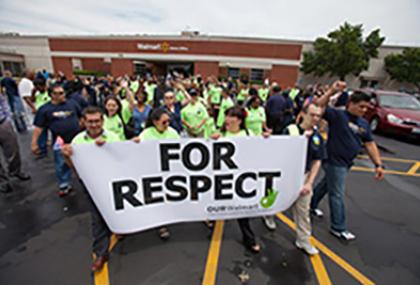
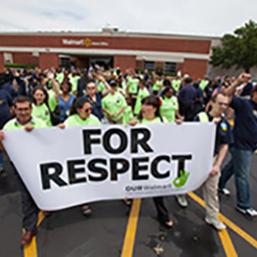
We are pleased to announce that the Fair Workweek Initiative (FWI) is expanding and becoming a joint partnership between Organization United for Respect (OUR) and the Center for Popular Democracy (CPD). Working with community and labor partners across the country, we have achieved tremendous strides in promoting stable workweeks that provide balance and economic security for working families. With over 1.8 million people now covered under fair workweek laws, we are excited to grow our capacity to support coalitions across the country and activate working people in the movement for a family-sustaining workweek.
The core of the fight for a fair workweek is about giving working people a voice and stability in a changing economy. Now with new technologies automating work, intensifying financialization and corporate monopolies undermining worker voice and eroding job quality, we need bold strategies that build long term power for working people. By joining OUR and continuing a deep partnership with CPD and its network, the Fair Workweek Initiative team will grow its capacity to develop innovative responses to these new challenges facing working families in the retail sector.
OUR, a growing CPD affiliate, is a movement leader in amplifying the voices of people working in retail who are on the frontlines of a changing and increasingly volatile economy. Combining innovations in technology, online to field organizing and leadership development, OUR has advanced new ways to activate and empower working people. Aligning with a growing network of workers and working in collaboration with the CPD Network, FWI and OUR’s new joint strategies will include innovations in worker rights enforcement, civic participation, and a broader policy agenda that addresses the changing nature of work in retail. As tremendous movement gains in raising wages and winning a fair workweek, earned sick time and family leave are under attack, FWI, OUR and CPD are excited to work together on a new online-to-field civic engagement program that will encourage working people employed in hourly service jobs to vote.
In September, FWI’s Director Carrie Gleason, Campaign Manager Terrysa Guerra, and Corporate Strategies Director Lily Wang will be joining OUR’s staff while staying closely engaged with CPD and our full network of affiliates. Supervising Attorney for Worker Justice Rachel Deutsch, who helped design the state and local fair workweek policy innovations, will remain at CPD and will continue to provide policy support for fair workweek campaigns and the broader economic justice policy agenda. Stay connected to the work of the Fair Workweek Initiative at fairworkweek.org.
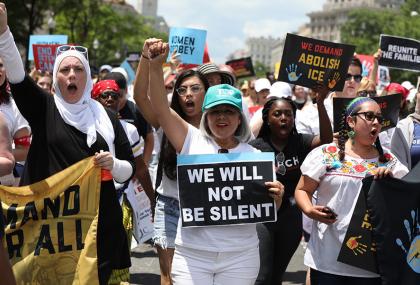
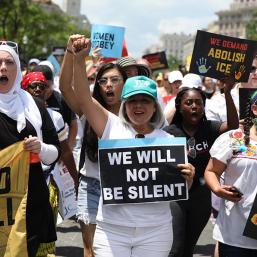
On June 28, CPD, along with our sister organization, CPD Action, partnered with the Women’s March to bring over two thousand women to the streets of DC to demand an end to the Trump administration’s inhumane and brutal anti-immigrant policies that have resulted in the separation of thousands of immigrant children from their families. Together, we brought the outrage and public pain to the doorsteps of lawmakers and federal officials who are responsible for policies that criminalize migration and tear families apart. Over six hundred women were arrested after shutting down the Hart Senate building, demanding an end to the zero-tolerance policy, the closing of all detention camps, and the abolition of ICE, an agency that is terrorizing our communities each day.
Over that weekend, hundreds of thousands of people, including affiliates from the CPD Network, took to the streets in their communities as part of the national #FamiliesBelongTogether day of action. Across the country, people of conscience marched to say families belong together in communities, not in cages. Over thirty CPD affiliates anchored rallies in their states, and centered the voices of immigrants and refugees who’ve been directly impacted by Trump’s White Nationalist anti-immigrant policies.
Affiliates from Illinois, Colorado, Connecticut, North Carolina, the District of Columbia, Louisiana, Nevada, New Jersey, New York, Pennsylvania, Texas, and many others joined the national call to demand that separated families be reunited and Congress move to abolish ICE. In Los Angeles, the Be A Hero Fund, a project of our sister organization CPD Action, partnered with a coalition of local immigrant rights organizations to hold a massive rally in front of City Hall with over thirty thousand supporters and allies in attendance.
The country now knows what immigration enforcement does, and what it looks like. The images we have seen and the cries we have heard evoke the worst moments in our country’s history, and we can no longer turn away. We must recommit ourselves to the values of a democratic and welcoming society, and demand an immigration system that protects families and upholds the dignity of human life. This is a defining moment that will shape our generation. We must not be silent. Donate today to make it clear that families belong together, and that all humans belong in freedom, not in cages.
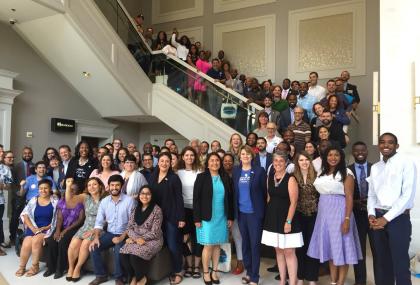
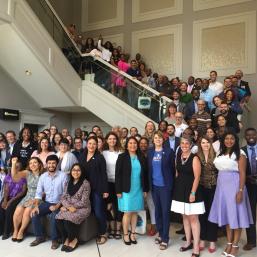
From July 12-14, 150 elected officials from over 30 states and 90 jurisdictions joined Local Progress in Minneapolis, Minnesota for their seventh annual convening. Throughout the weekend, Local Progress members shared with each other about their challenges and experiences as elected officials, as well as strategized about how to work toward “Taking Back Power: Reclaiming Government by the People,” which was the convening’s theme. Local Progress has grown bigger over the last year as well as more diverse and cohesive as a network, all of which was on display in Minneapolis. Check out #LP2018 on social media to hear directly from the elected officials in attendance.
The convening began at Minneapolis City Hall, where Council President Lisa Bender grounded the group in amazing, recent, local victories and Local Progress Vice Chair and Philadelphia Councilmember Helen Gym detailed a year of growth and success in the network. Congressman Keith Ellison challenged the group to build a local movement so strong it transcends to the national level. CPD affiliates Centro de Trabajadores Unidos en la Lucha and Take Action Minnesota also welcomed Local Progress to the North Star State and helped inform or lead programming throughout the conference. Read more on our blog.
Breakout discussions over the course of the event ranged from protecting immigrants to winning good jobs, from building worker power to strategies to create and preserve affordable housing, and to reforming and transforming public safety in our cities. Other inspiring sessions featured CPD Network President and Co-Executive Director Jennifer Epps-Addison, Local Progress founding director Ady Barkan, St. Paul Mayor Melvin Carter, Amalgamated Bank CEO Keith Mestrich, AFL-CIO Executive Vice President Tefere Gebre, SEIU Executive Vice President Heather Conroy, and Senator Amy Klobuchar among others. Watch the livestream here to see Ady and Jennifer ignite the room with hope in the closing plenary panel, knitting together our racial, economic, and immigrant justice work, the origin story of Local Progress, candidate recruitment, and strategy all in one discussion about how we save our democracy and build power in our country.



